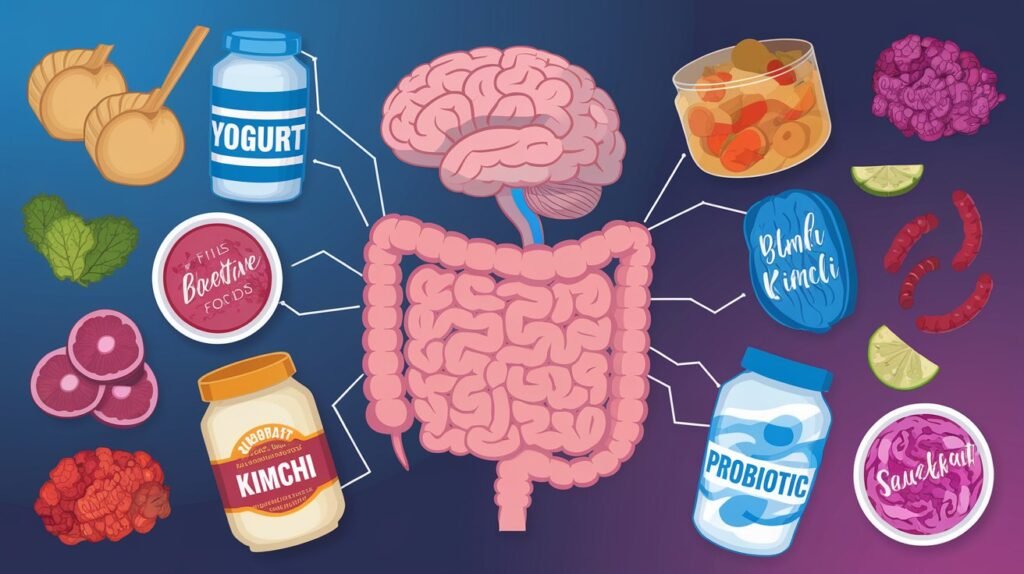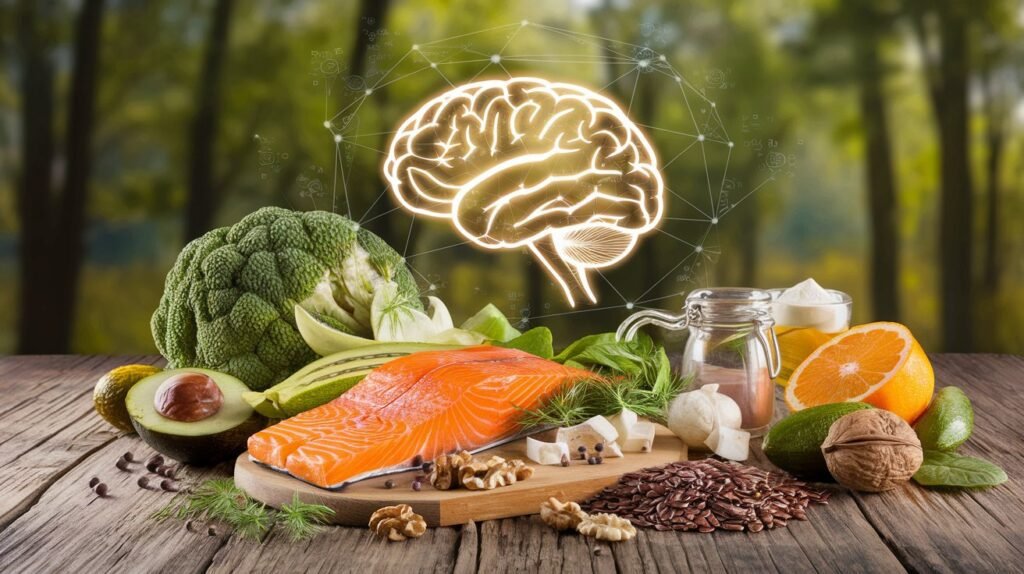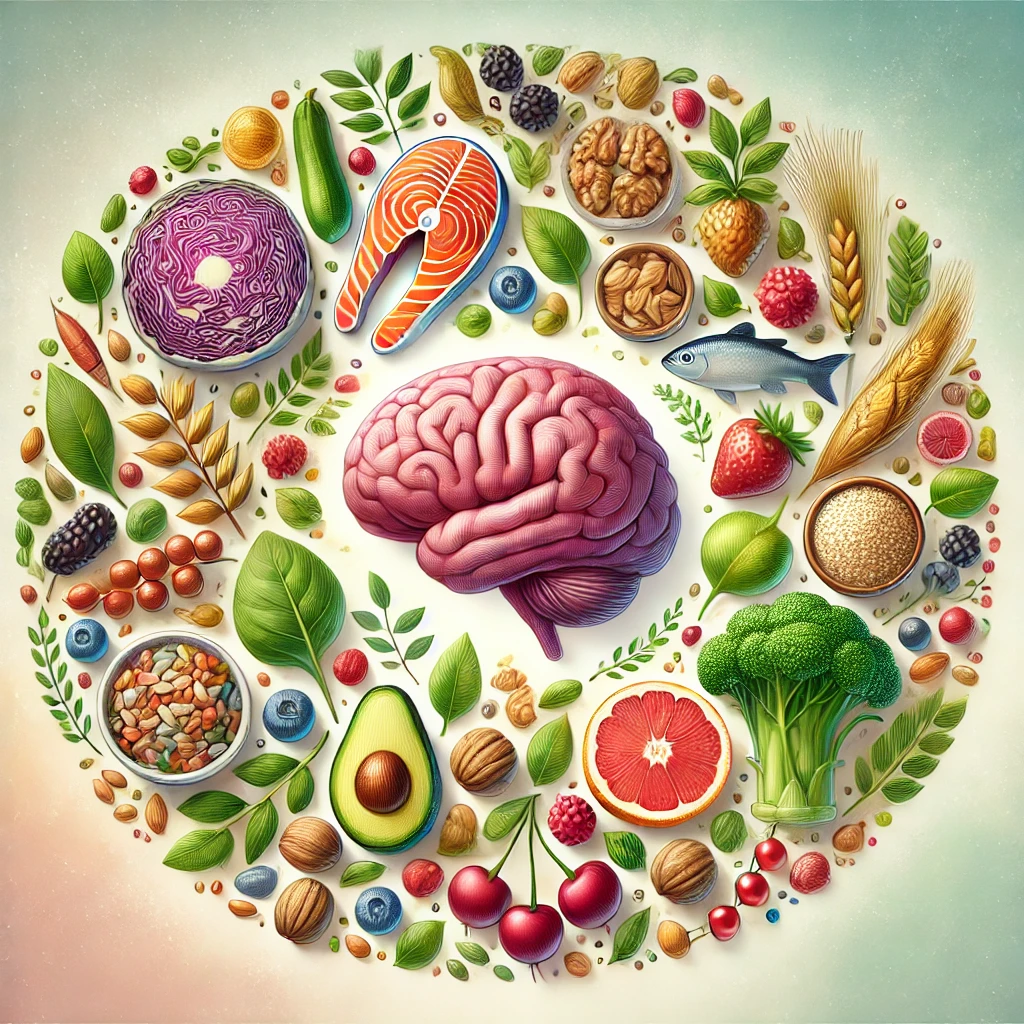Introduction to Nutrition and Mental Health
Mental health affects our emotions, thoughts, and behaviors, influencing how we handle stress, relate to others, and make choices. In recent years, studies have increasingly highlighted a strong connection between nutrition and mental health. Proper nutrition not only benefits physical health but also plays a critical role in psychological well-being. By exploring the link between the foods we eat and our mental state, we can begin to appreciate how dietary changes might improve or even prevent mental health issues.
This article will examine the link between nutrition and mental health, explore key nutrients for psychological well-being, and provide a diet plan that supports mental wellness.
Table of Contents
Nutrition and Mental Health
Why Nutrition Matters for Mental Health

The Gut-Brain Axis: How Digestion Impacts the Brain
One of the primary ways in which diet affects mental health is through the gut-brain axis. This bidirectional communication pathway connects the gastrointestinal tract and the brain. A healthy gut promotes the production of neurotransmitters, like serotonin and dopamine, that influence mood and cognition. Conversely, a diet lacking in essential nutrients can contribute to inflammation in the gut, leading to mood disturbances and cognitive issues.
Chronic Inflammation and Mental Health
Research has found that poor dietary choices, especially those high in sugar, refined carbs, and unhealthy fats, can lead to chronic inflammation, a condition often linked to mental health issues such as depression and anxiety. Chronic inflammation can disrupt neurotransmitter function, weaken brain cell connections, and impair cognitive performance, all of which contribute to poor mental health.
Nutrition and Mental Health: Nutrients that Benefit Mental Health

1. Omega-3 Fatty Acids
Omega-3s, found in fish, flaxseed, and walnuts, are essential for brain function. These fatty acids support the structure of brain cells, reduce inflammation, and are associated with a lower risk of depression.
Omega-3s and Depression
Multiple studies have indicated that people with depression often have lower levels of omega-3s in their bloodstream. Omega-3s are known to play a role in serotonin and dopamine regulation, neurotransmitters crucial for mood regulation.
| Omega-3 Source | Daily Recommended Intake |
|---|---|
| Salmon (100g) | 1,250 mg |
| Flaxseed Oil (1 tbsp) | 7,196 mg |
| Walnuts (1 oz) | 2,542 mg |
2. B Vitamins
The B vitamins, especially B6, B9 (folate), and B12, are essential for mental health. They help produce neurotransmitters that regulate mood and are involved in cellular energy production.
B Vitamins and Cognitive Decline
Research suggests that a deficiency in B vitamins may lead to symptoms of depression, fatigue, and cognitive decline. Folate, for example, has been linked with depression, with some studies showing that low levels can make antidepressants less effective.
| B Vitamin Source | B6 (mg) | Folate (µg) | B12 (µg) |
|---|---|---|---|
| Chickpeas (1 cup) | 1.1 | 282 | 0 |
| Spinach (1 cup) | 0.4 | 263 | 0 |
| Salmon (100g) | 0.5 | 28 | 2.8 |
3. Magnesium
Magnesium is involved in hundreds of biochemical reactions in the body and is essential for maintaining a calm mind and reducing anxiety. Foods rich in magnesium, like spinach, pumpkin seeds, and dark chocolate, have been associated with reduced anxiety and stress levels.
| Magnesium Source | Amount per 100g |
|---|---|
| Spinach | 79 mg |
| Pumpkin Seeds | 262 mg |
| Dark Chocolate (70%) | 228 mg |
4. Vitamin D
Vitamin D is linked to the regulation of mood and the prevention of depression. Since it’s challenging to obtain enough vitamin D from food alone, sunlight exposure and supplementation are often recommended.
| Vitamin D Source | Amount per Serving |
|---|---|
| Salmon (100g) | 526 IU |
| Fortified Milk (1 cup) | 120 IU |
| Egg Yolk (1) | 41 IU |
Nutrition and Mental Health: The Impact of Diet on Specific Mental Health Disorders
Depression and Anxiety
Depression and anxiety are two of the most common mental health disorders worldwide. Studies suggest that a poor diet can exacerbate the symptoms of both. A high intake of processed and sugary foods has been linked with increased risk of depression, while diets rich in whole foods like fruits, vegetables, and lean proteins have been associated with better mental health outcomes.
Cognitive Decline and Dementia
The link between diet and cognitive decline is especially strong. Diets rich in antioxidants, omega-3 fatty acids, and low in inflammatory foods are associated with reduced risks of dementia and cognitive decline.
| Mental Health Disorder | Dietary Influences |
|---|---|
| Depression | Low omega-3s, vitamin D, and high sugar intake |
| Anxiety | Low magnesium and omega-3s |
| Cognitive Decline | Low B vitamins, high saturated fat intake |
| Dementia | Low antioxidant and omega-3 intake, high sugar |
Developing a Nutrition Plan for Mental Health

Balanced Macronutrient Intake
Ensuring a balanced intake of carbohydrates, proteins, and fats supports steady energy levels, which can prevent mood swings and irritability.
- Carbohydrates: Choose complex carbs like whole grains and vegetables for stable energy.
- Proteins: Lean proteins like chicken, fish, and legumes are essential for neurotransmitter production.
- Fats: Healthy fats from sources like nuts, olive oil, and avocados support brain structure and reduce inflammation.
Mindful Eating and Routine
Adopting a mindful approach to eating, such as focusing on whole foods and eating meals at regular intervals, can help prevent blood sugar crashes and mood dips. A structured eating schedule can regulate energy levels and support mood consistency.
Hydration
Staying hydrated is crucial for optimal brain function. Dehydration can contribute to fatigue, irritability, and impaired cognitive performance.
Current Research and Statistics on Nutrition and Mental Health
Mediterranean Diet and Mental Health
The Mediterranean diet, rich in fruits, vegetables, whole grains, and olive oil, has consistently shown positive effects on mental health. According to a study published in BMC Medicine, individuals who followed a Mediterranean-style diet were 33% less likely to develop depression compared to those who consumed a Western diet.
DASH Diet and Depression
Another study in The American Journal of Clinical Nutrition found that people who followed the Dietary Approaches to Stop Hypertension (DASH) diet showed a 24% lower risk of developing depression. This diet is low in processed foods and high in vegetables, fruits, and whole grains, highlighting the importance of unprocessed foods in maintaining mental health.
| Diet | Reduced Risk of Depression |
|---|---|
| Mediterranean Diet | 33% |
| DASH Diet | 24% |
Practical Tips to Incorporate Mental Health-Boosting Foods
- Increase Omega-3s: Add fatty fish to your diet twice a week or consider a supplement.
- Snack on Nuts and Seeds: Carry a mix of walnuts, almonds, and pumpkin seeds for a quick magnesium boost.
- Include Probiotics: Incorporate yogurt, kefir, and fermented foods to promote gut health.
- Limit Processed Foods: Minimize intake of refined carbs and sugars, which can lead to blood sugar spikes and crashes.
- Stay Hydrated: Aim for 8 glasses of water daily, and adjust for activity levels.
Nutrition and Mental Health: The Conclusion
The connection between nutrition and mental health is profound. By prioritizing a diet rich in whole foods, essential vitamins, and minerals, individuals can support mental clarity, reduce symptoms of depression and anxiety, and protect against cognitive decline. While diet alone cannot substitute for professional mental health treatment, a nutrition-focused approach can enhance treatment outcomes and contribute to a holistic mental health strategy.
References
- Jacka, F. N., et al. (2017). A Mediterranean-style diet is associated with lower risk of depression. BMC Medicine.
- Sanchez-Villegas, A., et al. (2015). Dietary approaches to stop hypertension (DASH) diet and mental health outcomes. American Journal of Clinical Nutrition.
- Grosso, G., et al. (2020). Dietary patterns and mental health: A cross-sectional study. Frontiers in Psychology.




